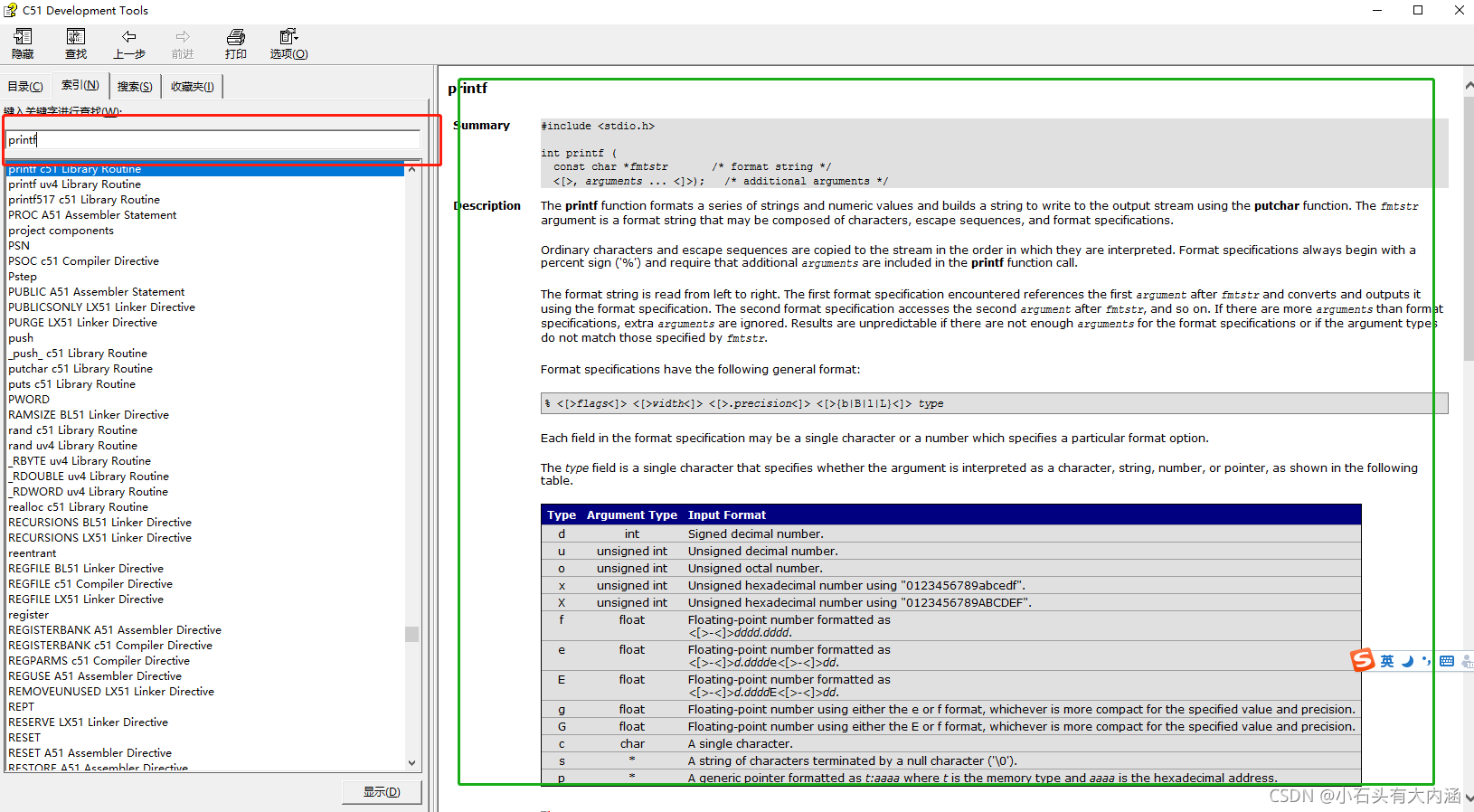原文来自keil软件 help 一栏, 如下图:

printf
#include <stdio.h>
int printf (
const char *fmtstr /* format string */
<[>, arguments ... <]>); /* additional arguments */
原文:
Description The printf function formats a series of strings and numeric values and builds a string to write to the output stream using the putchar function. The fmtstr argument is a format string that may be composed of characters, escape sequences, and format specifications.
Ordinary characters and escape sequences are copied to the stream in the order in which they are interpreted. Format specifications always begin with a percent sign (’%’) and require that additional arguments are included in the printf function call.
The format string is read from left to right. The first format specification encountered references the first argument after fmtstr and converts and outputs it using the format specification. The second format specification accesses the second argument after fmtstr, and so on. If there are more arguments than format specifications, extra arguments are ignored. Results are unpredictable if there are not enough arguments for the format specifications or if the argument types do not match those specified by fmtstr.
Format specifications have the following general format:
% <[>flags<]> <[>width<]> <[>.precision<]> <[>{b|B|l|L}<]> type
Each field in the format specification may be a single character or a number which specifies a particular format option.
Each field in the format specification may be a single character or a number which specifies a particular format option.
note
- The optional characters l or L may immediately precede the type character to respectively specify long types for d, i, u, o, x, and X.
- The optional characters b or B may immediately precede the type character to respectively specify char types for d, i, u, o, x, and X.
Characters following a percent sign that are not recognized as a format specification are treated as ordinary characters. For example, “%%” writes a single percent sign to the output stream.
The flags field is a single character used to justify the output and to print +/- signs and blanks, decimal points, and octal and hexadecimal prefixes, as shown in the following table.
The width field is a non-negative number that specifies the minimum number of characters printed. If the number of characters in the output value is less than width, blanks are added on the left (by default) or right (when the - flag is specified) to pad to the minimum width. If width is prefixed with a ‘0’, zeros are padded instead of blanks. The width field never truncates the output. If the length of the output value exceeds the specified width, all characters are output.
The width field may be an asterisk (’*’), in which case an int argument from the argument list provides the width value. Specifying a ‘b’ in front of the asterisk specifies that the argument is an unsigned char.
The precision field is a non-negative number that specifies the number of characters to print, the number of significant digits, or the number of decimal places. The precision field can cause truncation or rounding of the output value in the case of a floating-point number as specified in the following table.

The precision field may be an asterisk (’*’), in which case an int argument from the argument list provides the value. Specifying a ‘b’ in front of the asterisk specifies that the argument is an unsigned char.
note
- You must ensure that the argument type matches that of the format specification. You may use type casts to ensure that the proper type
is passed to printf.- This function is implementation-specific and is based on the operation of the _getkey and putchar functions. These functions, as
provided in the standard library, read and write characters using the
microcontroller’s serial port. Custom functions may use other I/O
devices.- The total number of bytes that may be passed to this function is limited due to the memory restrictions imposed by the 8051. A maximum of 15 bytes may be passed in SMALL or COMPACT model. A maximum of 40 bytes may be passed in LARGE model.
Example
#include <stdio.h>
void tst_printf (void) {
char a = 1;
int b = 12365;
long c = 0x7FFFFFFF;
unsigned char x = 'A';
unsigned int y = 54321;
unsigned long z = 0x4A6F6E00;
float f = 10.0;
float g = 22.95;
char buf [] = "Test String";
char *p = buf;
printf ("char %bd int %d long %ld\n",a,b,c);
printf ("Uchar %bu Uint %u Ulong %lu\n",x,y,z);
printf ("xchar %bx xint %x xlong %lx\n",x,y,z);
printf ("String %s is at address %p\n",buf,p);
printf ("%f != %g\n", f, g);
printf ("%*f != %*g\n", (int)8, f, (int)8, g);
}

